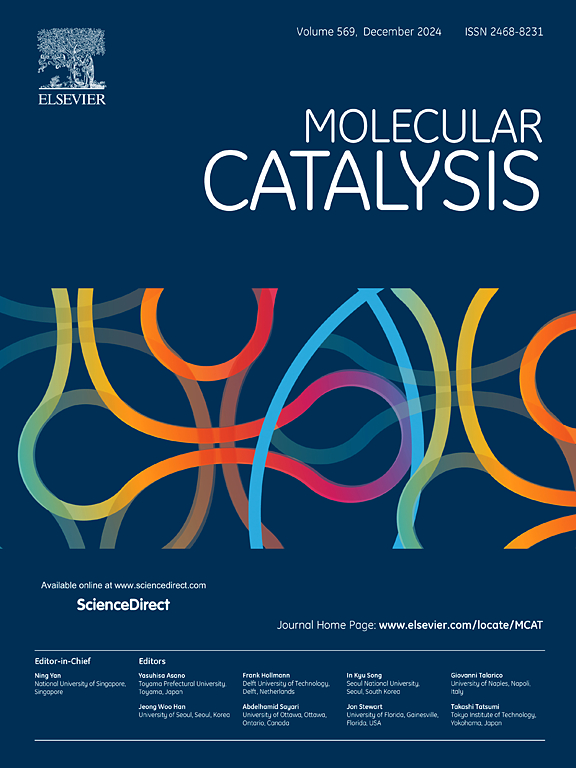Synthesis and catalytic application of MOF-808 AA as heterogeneous catalyst in catalytic transfer hydrogenation reactions of α-Keto amides
IF 3.9
2区 化学
Q2 CHEMISTRY, PHYSICAL
引用次数: 0
Abstract
In this study, MOF-808 AA was synthesized by modulating the ratio of DMF to acetic acid, and its catalytic performance was evaluated in the transfer hydrogenation of α-keto amides using isopropanol (IPA) as a green hydrogen source and solvent. Furthermore, the methanol activation method was successfully applied to modify MOF-808 AA, resulting in a significantly enhanced catalyst that surpasses the performance of its pristine counterpart in the catalytic transfer hydrogenation (CTH) of α-keto amides. The catalytic conversion of α-keto amide to α‑hydroxy amide proceeded with remarkable efficiency, yielding 84–99 % conversion within a remarkably brief reaction period of 30 min. This protocol showcased remarkable catalytic versatility, efficiently converting a diverse range of α-keto amides, both activating and deactivating substituents on the aniline ring and benzene rings attached to the keto group. A comprehensive characterization of the material's physicochemical properties was conducted using a range of analytical techniques, including, PXRD, nitrogen adsorption-desorption, ammonia TPD, TGA, XPS, FTIR, SEM-EDX, CHN(O) analysis, and ICP-OES. These techniques thoroughly understood the material's structure, composition, and properties. M-MOF 808 AA demonstrated exceptional stability and reusability as a true heterogeneous catalyst, maintaining its activity without any discernible loss over at least four consecutive reaction cycles. A gram-scale conversion was successfully achieved to demonstrate the bulk scalability and industrial potential of the methanol-activated MOF-808 AA catalyst, highlighting its promise for large-scale synthesis and applications.

mof - 808aa异相催化剂在α-酮酰胺转移加氢反应中的合成及催化应用
本研究通过调节DMF与乙酸的比例合成MOF-808 AA,并以异丙醇(IPA)作为绿色氢源和溶剂,对其在α-酮类酰胺转移加氢反应中的催化性能进行了评价。此外,甲醇活化法成功地对MOF-808 AA进行了改性,得到了显著增强的催化剂,其α-酮类酰胺的催化转移加氢(CTH)性能优于原始催化剂。α-酮酰胺催化转化为α-羟基酰胺的效率非常高,在30分钟的极短反应时间内转化率达到84 - 99%。该方案显示了显著的催化多功能性,有效地转化了多种α-酮酰胺,包括活化和失活酮基上苯胺环和苯环上的取代基。采用一系列分析技术,包括PXRD、氮吸附-解吸、氨TPD、TGA、XPS、FTIR、SEM-EDX、CHN(O)分析和ICP-OES等,对材料的物理化学性质进行了全面表征。这些技术彻底了解了材料的结构、组成和性能。作为一种真正的多相催化剂,M-MOF 808 AA表现出优异的稳定性和可重复使用性,在至少四个连续的反应周期中保持其活性而没有任何明显的损失。成功实现了克级转化,证明了甲醇活化MOF-808 AA催化剂的批量可扩展性和工业潜力,突出了其大规模合成和应用的前景。
本文章由计算机程序翻译,如有差异,请以英文原文为准。
求助全文
约1分钟内获得全文
求助全文
来源期刊

Molecular Catalysis
Chemical Engineering-Process Chemistry and Technology
CiteScore
6.90
自引率
10.90%
发文量
700
审稿时长
40 days
期刊介绍:
Molecular Catalysis publishes full papers that are original, rigorous, and scholarly contributions examining the molecular and atomic aspects of catalytic activation and reaction mechanisms. The fields covered are:
Heterogeneous catalysis including immobilized molecular catalysts
Homogeneous catalysis including organocatalysis, organometallic catalysis and biocatalysis
Photo- and electrochemistry
Theoretical aspects of catalysis analyzed by computational methods
 求助内容:
求助内容: 应助结果提醒方式:
应助结果提醒方式:


